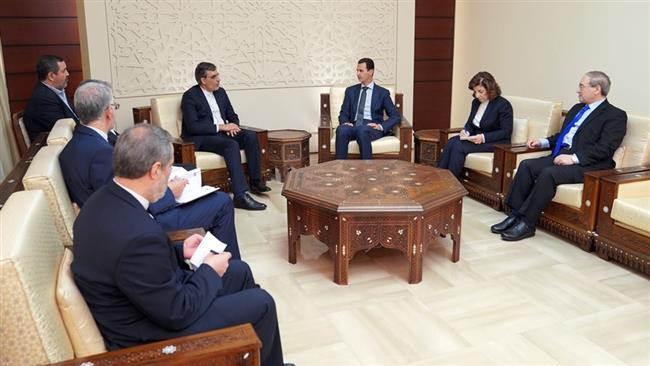
RNA - Assad made the remarks in a meeting with Iranian Deputy Foreign Minister for Arab and African Affairs Hossein Jaberi Ansari in the Syrian capital Damascus on Saturday, according to Syria’s official news agency, SANA.
Syrian Deputy Foreign Minister Faisal al-Mekdad and senior presidential adviser Bouthaina Shaaban were also present at the meeting.
Iran and Russia have been offering military advisory support to the Syrian government in its battle against extremist militants.
Russian jets have also been conducting air raids against the Daesh Takfiri terrorist group and other terror outfits inside Syria at the Damascus government’s request since September 2015.
The airstrikes have helped Syrian forces advance against anti-Damascus militants, who have been wreaking havoc in the Arab country since 2011.
Assad and Jaberi Ansari also discussed ways to enhance the strategic Syrian-Iranian ties in various areas, especially in fighting terrorism and mutual efforts for the success of the forthcoming Syrian National Dialogue Congress in the Russian resort city of Sochi.
The next round of intra-Syrian national dialogue between the Syrian government and the opposition would commence in Sochi on Monday.
On Thursday, Russia said some 1,600 people had been invited to the talks aimed at resolving the years-long crisis in the Arab country.
Last December, Russia, Iran and Turkey agreed to hold the congress in Sochi on January 29-30. While the Syrian government at the time immediately announced that it would attend the event, 40 Syrian “opposition” groups rejected the Russian initiative, which is also aimed at agreeing on a post-war constitution in the Arab country.
Assad and Jaberi Ansari also exchanged views on Turkey’s military assault in Syria’s northwestern region of Afrin, saying the military campaign was aimed at grabbing Syrian territories, backing terrorist organizations operating inside the conflict-plagued Arab country, and torpedoing peace efforts on Syria.
Last week, Turkey launched a new air and ground operation, called "Operation Olive Branch," around the area of Afrin to oust the Kurdish People's Protection Units (YPG), which Ankara views as a terror organization and the Syrian branch of the outlawed Kurdistan Workers’ Party (PKK).
The offensive began days after the US said it will work with Kurdish militants to set up a 30,000-strong force inside Syria near the Turkish border.
Ankara first deployed troops to northern Syria in August 2016 after Kurdish militants refused to withdraw from the Syrian territory they had seized from Daesh.
During the Saturday meeting, Jaberi Ansari further stressed Iran’s unwavering support for Syria in its fight against terrorism and in the county’s reconstruction process.
In a separate meeting earlier in the day, the Iranian official and Syria’s Foreign Minister Walid al-Muallem discussed the latest developments in Syria and the region.
They emphasized the significance of the Sochi peace talks, expressing hope that the National Dialogue Congress would push for a peaceful settlement of the Syrian crisis.
According to Russian Foreign Ministry spokesperson Maria Zakharova, international observers, including those from the UN, will participate in the congress along with Syrian parties. Russia's Foreign Minister Sergei Lavrov will also attend.
Meanwhile, Syria’s foreign-backed main opposition group has refused to attend the Russia-brokered peace talks in Sochi.
The Saudi-affiliated Syrian High Negotiations Commission (HNC) announced last week it would need further details before it could make a final decision on whether to take part in the event, which dozens of opposition armed groups have already rejected.
Eight rounds of Syria peace talks, which took place in the Swiss city of Geneva, failed to achieve tangible results, mainly due to the opposition’s insistence that the Syrian government cede power.
A parallel peace process between Syria’s warring parties in the Kazakh capital Astana has resulted in significant achievements instead, leading to ceasefires and the establishment of de-escalation zones across the conflict-ridden country. The Astana talks have been brokered by Iran, Russia and Turkey.
847/940